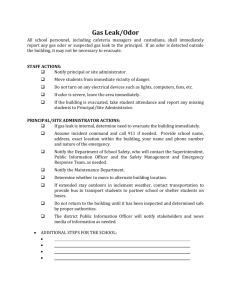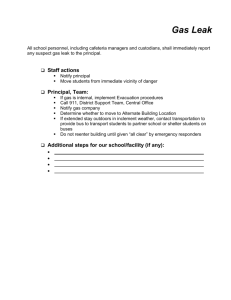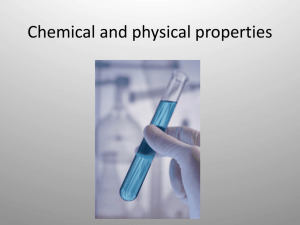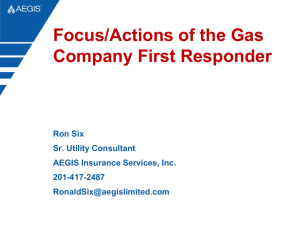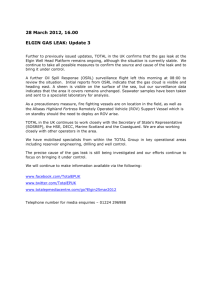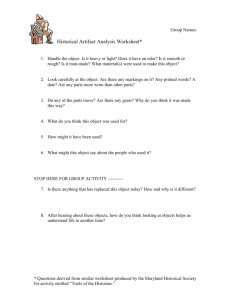aegis - Western Regional Gas Conference
advertisement
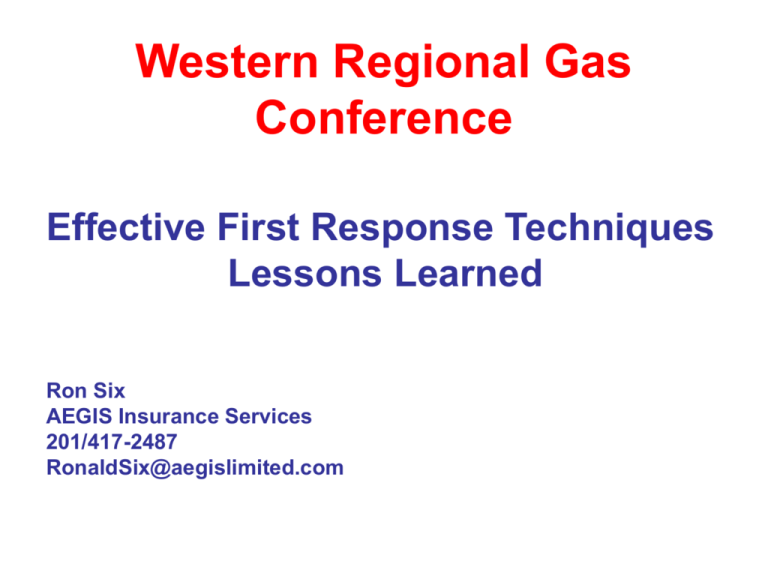
Western Regional Gas Conference Effective First Response Techniques Lessons Learned Ron Six AEGIS Insurance Services 201/417-2487 RonaldSix@aegislimited.com A AE E GG II S S ssociated lectric as nsurance ervices AEGIS Background Information • Utility Mutual Insurance Company (member owned) • Formed in 1975 by 22 gas utilities • Electric Utilities began joining in 1977 • 490 members – 95% utilities and related energy The Call Center is the First Line of Defense • Not every call is a gas emergency • Listen to the customer and ask questions in order to gather the information needed • Odor Complaint/Gas Emergency investigations …begin with a call Receiving The Call • Basic information • Name • Address • Type of facility • Nature of the call Additional Questions • Where is the odor? • How long have you noticed it? • How strong is the odor? • Can you hear anything? • Is there any construction activity in the area? • Any recent plumbing work? Is It Static Or Dynamic? Where is the odor? = At gas range vs. throughout How long smelled? = For a week vs. just noticed it How strong is the odor? = Barely smell vs. making me sick Can you hear anything? = No vs. hissing sound Anyone moved recently? = No vs. apartment next door moved Any plumbing done? = No vs. husband just installed range Any construction in area? = No vs. backhoe digging out front Steps to Consider When Receiving a Dynamic Call • Ask the customer to leave the premises until help arrives • Advise the customer to leave the phone off the hook and not to operate any lights or turn any appliances off or on Leave things as they are… leave the premises immediately Call Center Considerations • Transferring the call to dispatch • Relaying the proper information • Dispatching the call in a timely manner and to the proper people • Notifying supervisory personnel • Calling fire/police departments • Maintaining communications • Documentation BRADY ST. #894 #8 #902 2” Steel Gas Main 45 psi Excavation Sewer Manhole SLOCUM ROAD We should offer the same basic training in regards to recognizing a gas emergency and the actions to take to protect life and property to local first responders (fire & police personnel) that we provide to gas company first responders. Working together is the Key! • The fire departments job should be to secure the area • The gas companies job should be to secure the gas • The main job of both is Public and Personnel Safety AEGIS Hazard Awareness videos I & II http://aegislimited.sawmac.com/form.php Responding to Odor Complaint Calls Remember: • You must consider it to be a hazardous condition until you prove, by use of instrumentation, that it is not! HAZARD EXTENT LIFE PROPERTY Figure # 1 Gas Meter #6 ASH STREET Sewer Ditch 4” Steel Main 35 PSI Potential Ignition Sources • Doorbell • Security system • Light Switch • Matches, lighter • Pilot Light • Cell phone/pager • Flashlight • Back-up generator • Telephone • Lightning • Electrical appliance • Static electricity • Automobile • And many others Remember: • The biggest built-in safety factor of natural gas is that it is lighter than air; however… it will vent to the atmosphere someplace! Our main job is not finding & fixing leaks Our main job is public safety The Combustible Gas Indicator “Your Decision Maker” • CGI should be used to: – Classify an atmosphere • Inside a building or in a confined space – Classify underground leakage • Determine “Where is the gas?” – Pinpoint underground leakage • Determine “Where is the leak?” • You must know: • How to properly use it • What readings might constitute a hazardous condition Combustible Gas Indicators (CGI) • GMI Gas Surveyor • J&N Sensit Gold • Bascom-Turner Ranger • MSA Passport • And others Evaluating The Leak Where is the gas? gas? r w h e e is the Evaluating The Leak • • • • • W here is the gas? How much is there? Extent of hazard (migration) Relation to other structures Evaluate/evacuate Centering The Leak • Probe holes must be of sufficient depth • Test all available openings • “Zero out” N-S-E-W • You must have sufficient information to make a good judgement Be Careful – “Don’t make a leak, looking for a leak.” Incident (2005) • A homeowner contacted the gas company stating that “she smelled a very strong odor of gas in the vicinity of her gas meter”. • The gas company sent a service technician to investigate the odor complaint. Upon arrival, the technician noticed the smell of gas as soon as he got out of his truck. • He decided to put a bar hole down near the riser to check the soil atmosphere. The temperature was around 5 degrees and there was frost in the ground making it difficult to make the test hole. Incident (2005) Cont’d. • After a lot of effort, he was able to get a test hole in the ground below the frost layer. When he pulled his probe bar out of the ground, gas started blowing up through the test hole. The escaping gas was making considerable noise so he put the probe bar back in the hole. He ran back to the truck to get a shovel to dig the plastic service up in order to squeeze it off and stop the leak. • As he was attempting to expose the service, approximately 30 minutes after the line was hit, there was an ignition and two people inside of the home were badly injured. What Happened? • Bar testing and checking the soil atmosphere for gas is a crucial part of the overall odor complaint investigation. It is necessary to make the test hole a sufficient depth in order to obtain an accurate reading, thus getting below the frost layer is essential. • In this case, the bar should have been left out of the bar hole to allow the gas to “vent” and notifying the occupants to leave the house until the line could be shut off. • The main priority is Public Safety! Emergency Response Pre-planning Can Be Extremely Helpful • Personnel readiness • Personnel training • Communication • Emergency plan • Coordination with fire service • Availability of special equipment • System records • Involvement of claims & legal depts. • Public relations media response Makesafe Actions to Consider • Implement emergency plan • Call for additional help • Notify police/fire departments • Evacuate premises Time Is Critical • Block off the area • Stop the flow of gas • Eliminate ignition sources • Vent area Remember Public Safety! QUESTIONS? AEGIS Insurance Services Thank You Please visit our website @ www.aegislink.com
